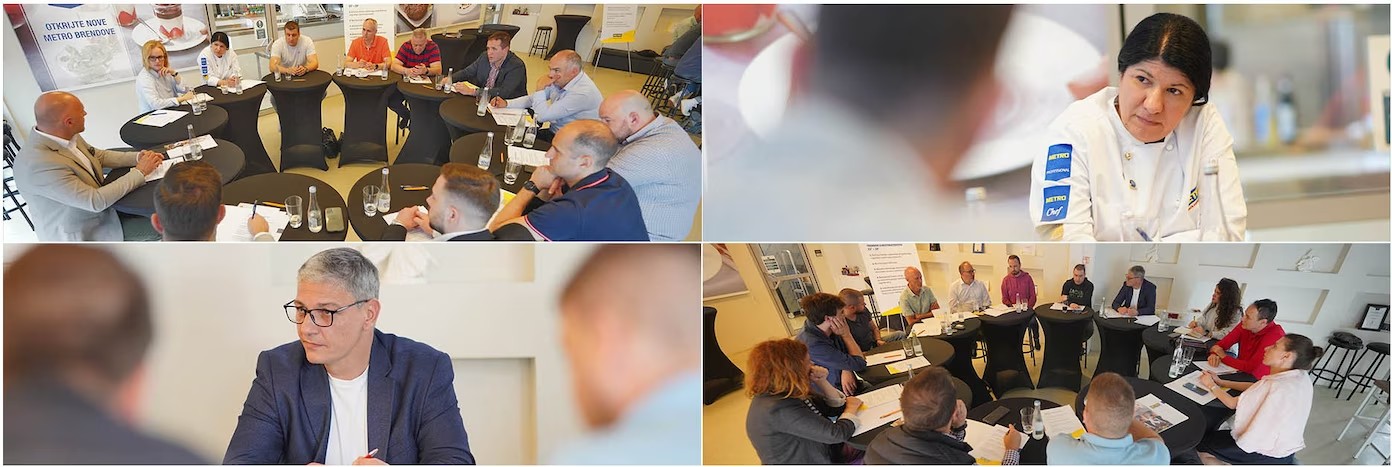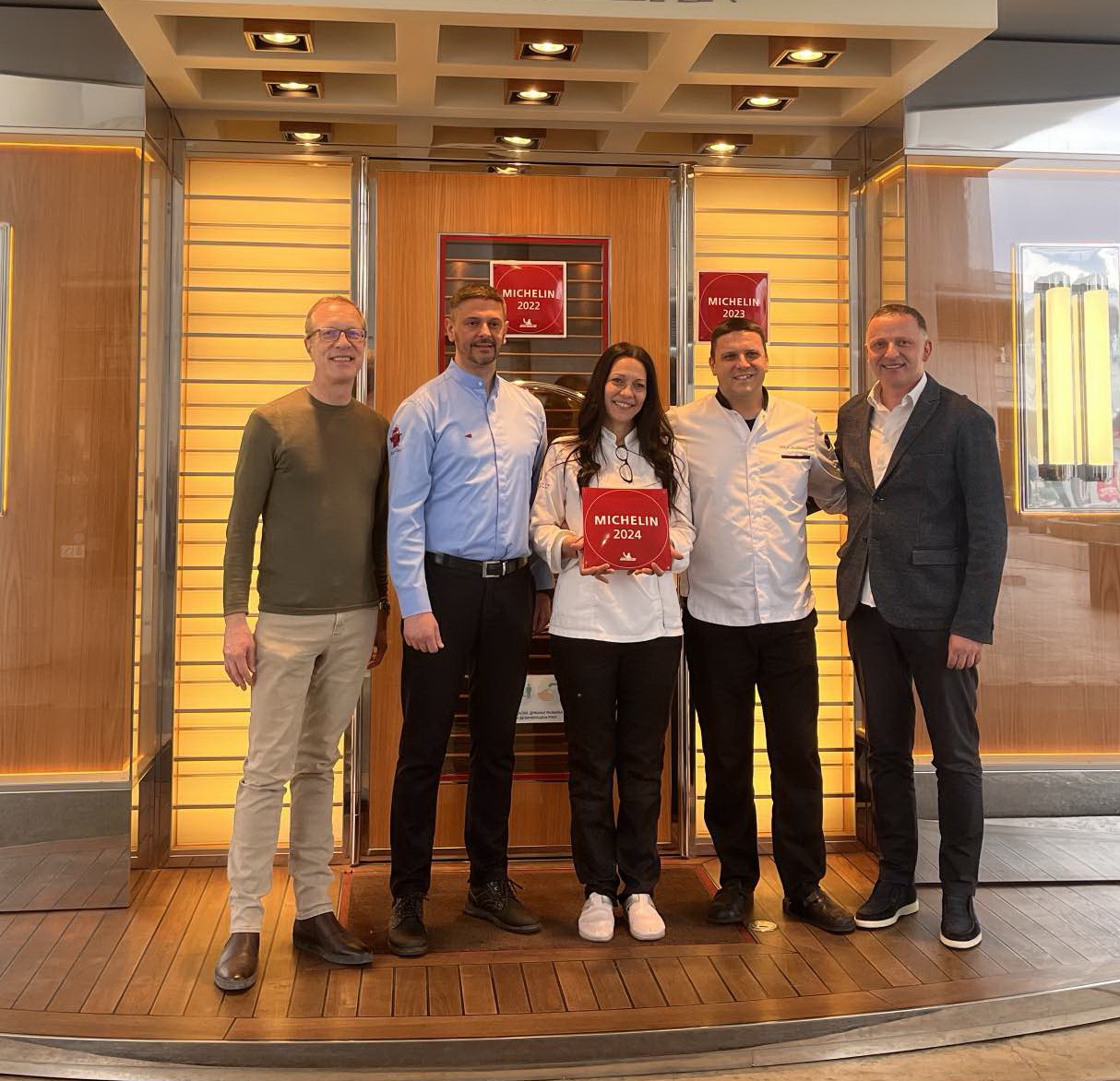
On the occasion of marking the decade of existence of the METRO HoReCa center, an expert meeting entitled Trends in Hospitality for 2023 and 2024 was held, at which representatives of some of the most famous and successful hotels, restaurants, associations and small catering businessmen in Serbia discussed and singled out the key trends in this area.
During the conversation, the participants discussed the events in the global and domestic hospitality industry, the consequences of the pandemic and the changes that have taken place and that are to come. The meeting was attended by representatives of the Association of Winemakers of Serbia (Stevan Rajta), SERSA (Dejan Živkoski and Marija Radović) and Bartenders 710 (Vladimir Simić), Vino & Fino (Jelena Stojčić), representatives of the Crowne Plaza Hotel (Jovica Nešković), Gorski (Aleksandar Novitović and Dejan Veljin), Hilton (Branislav Babić), Square Nine (Dušan Todić and Zdravko Gavrilović), Zira (Uroš Zorić), Jump Inn (Nikola Đurić) and restaurants Iva New Balkan Cuisine and Tisa (Vanja Puškar), Comunale (Marko Lukić) , Mandarina (Krsto Radović), Magellan and Pro Chef catering (Aleksandar Ilić), Langouste (Guillaume Iskandar), Salon 1905 (Vladimir Kučera), Embassy of Norway (Dejan Maksimović), Pivnica Žirafa (Aleksandar Tomić) and Koordinata Street (Stefan Živković) .
"The mission of the METRO HoReCa center has been supporting the professionalization of domestic hospitality for a decade, and for us, dialogue and conversation with the bearers of changes and trends, our partners, is the greatest recognition we can receive." In the years ahead, we want to remain a partner to everyone who believes that domestic catering has an even brighter future and our knowledge and experience are at the service of the entire profession. During the previous decade, we held more than 1000 events, including an extremely large number of professional trainings and master class training, with the aim of offering the profession an opportunity for qualitative growth as a wholesaler. Today, quality in domestic gastronomy is valued and recognized all over the world, and this is the motivation to continue learning, introducing world trends and nurturing the best of domestic tradition, in partnership with local chefs and the entire profession.", believes Milica Aleksić, manager of the METRO HoReCa center.
The gathering was led by Uroš Urošević, a well-known chef and previous manager of the METRO HoReCa Center, and Milica Aleksić, Doctor of Science in the field of gastronomy and current manager of the METRO HoReCa Center. The participants singled out key trends and developments, which they believe will shape the development of the hospitality industry in two separate areas this year and the next - restaurant and hotel industry. We highlight the key trends:
TRENDS IN RESTAURANTS
Development of fast & fine and fast & casual catering concepts / restaurants - restaurateurs who are passionate about cooking lean towards the concept that breaks down the "client-waiter-chef" barrier, creating a more intimate atmosphere in the restaurant itself.
The survival of the "dark kitchen" is questionable, due to the challenges of delivery, optimization of time from preparation to delivery, and preservation of meal quality. There is a very certain growth, motivated by the needs of certain target groups, to establish concepts such as "Incognito" or "Pop-Up" restaurants. It is predicted development of new "gastro zones" with small, craft and specialized activities.
One of the prominent bright examples that brought novelty to the gastronomic scene, and as the attendees characterized "from rebellion to trend" is the unique Koordinata Street in Zemun.
Another common opinion of those gathered at the round table is that due to a major change in trends or misunderstanding and interpretation, the survival and further development of the "Fine Dining" concept becomes questionable, and that it will certainly be necessary to redefine the meaning of the term "Fine Dining". .
The growth of automation and the use of technology in the food preparation process, especially in confectionery and bakery. Technology is gaining an increasingly important role due to the lack of manpower and the need to unify the preparation process (uniform quality). Despite digitization, food delivery through existing models is proving to be less efficient and restaurants are returning to the self-delivery concept.
Sustainability is gaining increasing influence on business, due to more and more guests who want to eat in facilities that have a minimal or lesser impact on the environment, and more and more restaurants with the concept of "zero waste" or those that throw plastic out of use (offer delivery packaging made of bamboo or " compostable"), recycle materials and reduce food waste. The need for recycling old and inefficient appliances is foreseen, and system support through subsidies would give good results (subsidy "old for new", "green energy" project - subsidies for installation of solar systems, etc.).
From the perspective of their own business, restaurateurs are in constant need of sustainable solutions in order to reduce energy consumption. There is also an ambition that with their sustainable projects, they influence the spread of awareness of the importance of sustainability issues at the level of the local community and beyond.
Food safety, quality and origin of food will be a priority for restaurants and hotels, with an extremely high need for raising awareness and education about food safety for all participants in the chain: production, transport, preparation and service. At the same time, simplification and a higher level of efficiency are expected through the introduction of digital systems, which can significantly facilitate the monitoring and verification of compliance with all food/service safety standards and optimize the risk monitoring process and record keeping time. Examples are "electronic declaration", for example applications that make information accessible to the "personal card" of the product, including the networking of all factors for the purpose of traceability (digital platform "from field to fork"). Restaurateurs express their willingness to contribute to the overall development in this area, and especially to establishing a balance between bureaucracy and substance.
Restaurateurs are ready to make their contribution in educating and spreading the awareness of young people about the importance of food safety, through educational activities in educational institutions of lower and secondary education.
TRENDS IN THE HOTEL INDUSTRY
In the future it is expected development of new hotel concepts, with an increasingly less visible difference between business (Work/Business) and relaxation (Leisure) types of hotels. It is expected that more and more hotels will provide the so-called "Bleisure" (business&leisure) concept, which is especially the case in city/urban areas. Accordingly, he expects a decrease in the demand for large banquet halls, except as facilities for weddings and weekend events. On the other hand the so-called 'stressless' or 'holistic hospitality' concepts, such as spa-hotels, wellness centers and similar service environments, are increasingly appearing in non-urban environments, i.e. 'natural' environments.
New technologies will play an increasingly important role, esp 'HiTech Housekeeping' which can simultaneously be a response to increased sanitary standards, but also to the lack of manpower. The same applies to hotels with implemented AI in service/service sectors.
In order to provide the highest quality service and retain the workforce, the domestic hotel industry in the coming years could introduce a "service charge" option (charging for services as a separate item), which is widely present in the world. In this way, the employees would also be empowered, and through additional training and earnings, they would be motivated to stay in this branch, but also in Serbia.
In the coming years it will the topic of pairing food and drinks to be one of the key ones, which became even more important with the arrival of two guidebooks in Serbia - Michelin and Gault&Millau, and the importance of this topic was highlighted after the concept of Wine Vision of Open Balkan and Food Vision of Open Balkan. At the same time, an increasing need for education of the entire hospitality sector on this topic is predicted, because requests for the right combinations come from more and more educated guests.
Finally, it is important to mention that there are more examples cooperation between architects and restaurateurs in designing, planning and designing catering establishments, and it is to be expected even greater synergy of these two professions, which can develop functional, efficient and sustainable facilities from the initial concept, according to the hospitality profession and needs. Increased interest in specialized education in this area is also expected, and they have been launched initiatives of experienced individuals and professional associations such as ASAP Talks "ARHI HoReCa - Values of architecture from the point of view of restaurateurs".
Source: announcement by Metro Horeca Centar/Metro Cash & Carry Serbia/Agencija Headline
READ: WHERE CAN I BUY THE BOOK TRADITIONAL RECIPES OF HOME SERBIAN CUISINE?
Read more:
The Recipes and Kuvar online portal is ranked among the TOP 50 websites in Serbia!If you are interested in all of ours recipes, click the link: RECIPES. Collections of the best recipes of our associates can be found in the cook section, if you want to read more, click on the link: COOK. If you want to see our front page, click on the link: RECIPES AND COOK ONLINE homepage.
Don't miss a recipe - Recipes and cookbook online on Facebook. Stay tuned, follow the Recipes and Cookbook twitter notifications!







